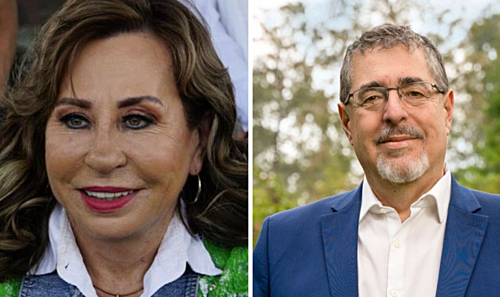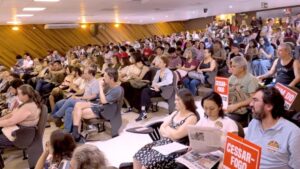
In a journey full of surprises this Sunday (25/06), the left managed to take two candidacies to the second round of the presidential elections in Guatemala.
The first round of the presidential race ended with a very unexpected result, despite the fact that the first place went to the same winner of the last election, in 2019.
According to information from the Supreme Electoral Court of Guatemala (TSE), after more than 95% of the ballot boxes were counted, businesswoman Sandra Torres, from the center-left party Union for Hope (UNE), obtained 15.3% of the votes, with she reaches the second round again.
This is the third time that Torres has run for the Presidency of Guatemala, and the other two times she has also reached the decisive round, losing in 2015 against former Liberal President Jimmy Morales (2016-2020) and in 2019 to the current president, conservative Alejandro Giammattei.
However, this is the first time that she will face another progressive candidate in the second round, scheduled for next August 20th.
The second most voted this Sunday was the big surprise of the day: Bernardo Arévalo, from Movimento Semente, gathered 12.1%, surpassing all right-wing candidates.
Arévalo’s performance was quite unexpected, as his percentages in all polls published during the campaign varied between 4% and 6% of the voting intentions.
Furthermore, Arévalo was not the only surprise of the day. In third place was the government candidate Manuel Conde, from the Vamos party, with 7.8%.
Also surprising was the fourth place of the nationalist Armando Castillo, from the Viva party, who got 7.4% of the votes.
Two of the top-ranked candidates in the polls were major disappointments. Former United Nations (UN) official Edmond Mulet of the center-right Cabal party was fifth with just 6.9%.
However, the greatest frustration was the candidacy of the extreme right, led by Zury Ríos Sosa, daughter of former dictator Efraín Ríos Montt (1981-1983). All polls placed her among the top three places, and in many of them she appeared in the lead, always with percentages above 15%, sometimes even above 20% of intentions. This Sunday, however, she won only 6.7% of the votes.
Who is Bernardo Arevalo?
Opera Mundi published this Sunday a small profile of the three figures best positioned in the polls, including Sandra Torres, the only candidacy that obtained in the first round a percentage similar to what the polls attributed to her.
However, the article did not talk about the surprising Bernardo Arévalo, who reached the second round and gained another 40 days in the campaign to try to repeat the feat of his father, former president Juan José Arévalo (1945-1951), whose story we will tell in the paragraphs below.
A 64-year-old sociologist, born in Montevideo (during his parents’ exile), Arévalo is the leader of the Seed Movement, which describes itself as an “ecological, progressive and liberal” party, although some local analysts prefer to categorize it as “social liberal”.
The political positions of his group in Congress show similarities with the style of Chilean President Gabriel Boric: for example, he considers the governments of Nicaragua and Venezuela as dictatorships and demands from President Giammattei an official posture of condemnation of Russia and support of Ukraine, with regarding the conflict between the two countries – he even asked in court (unsuccessfully) for the cancellation of the Guatemalan State’s contract for the acquisition of millions of doses of the Russian anti-covid vaccine Sputnik V.
However, the party’s most controversial link is with the president of El Salvador, the controversial businessman and influencer Nayib Bukele.
In these Guatemalan elections, the Salvadoran president did not openly express his support for any candidate, but in 2019, when the Seed Movement candidate was former public prosecutor Thelma Aldana, the main asset of the campaign were statements by Bukele, in which he asked youth votes and called her the “future president”.
Another situation, which perhaps also explains the phenomenon of Arévalo this year and why it was not predicted by the polls, is that, like Bukele during his candidacy in El Salvador (in 2019), Arévalo and the Seed Movement focused the efforts of this campaign year on social networks, without doing so many public acts and rallies.
Arévalo family
Despite his unexpected electoral performance, the surname Arévalo is not new in the Guatemalan Presidential Palace. His father was the writer and former president Juan José Arévalo, who governed the country between 1945 and 1951, known for a style that was called “spiritual socialism”, whose objective was “to liberate the individual psychologically”.
During that government, Guatemala carried out major reforms in health and education. The Guatemalan Institute of Social Security (IGSS) was also created, a reference in the country to this day.
However, Arévalo had to overcome several attempts at a coup d’état to complete his term. Most of these attacks carried out by the local right were sponsored by the US company United Fruit and the US embassy in the country, as reported in the famous book “As Veias Abertas da América Latina”, by the Uruguayan writer and journalist Eduardo Galeano.
In 1950, Arévalo senior elected his successor, the military Jacobo Árbenz, who maintained the progressive government program, but did not resist the onslaughts of the right and ended up the victim of a coup, in 1954.
With the beginning of the dictatorship of General Carlos Alberto Castillo, the Arévalo family was forced to flee the country, and found political asylum in Uruguay, where Bernardo Arévalo was born.
The clan would only return to the Central American country in the mid-1970s, although the dictatorial regime was still in force – at that time, under the orders of General Eugenio Laugerud. Juan José Arévalo died in Guatemala City in 1990, when the country had already regained democracy.
Source: www.brasildefato.com.br

